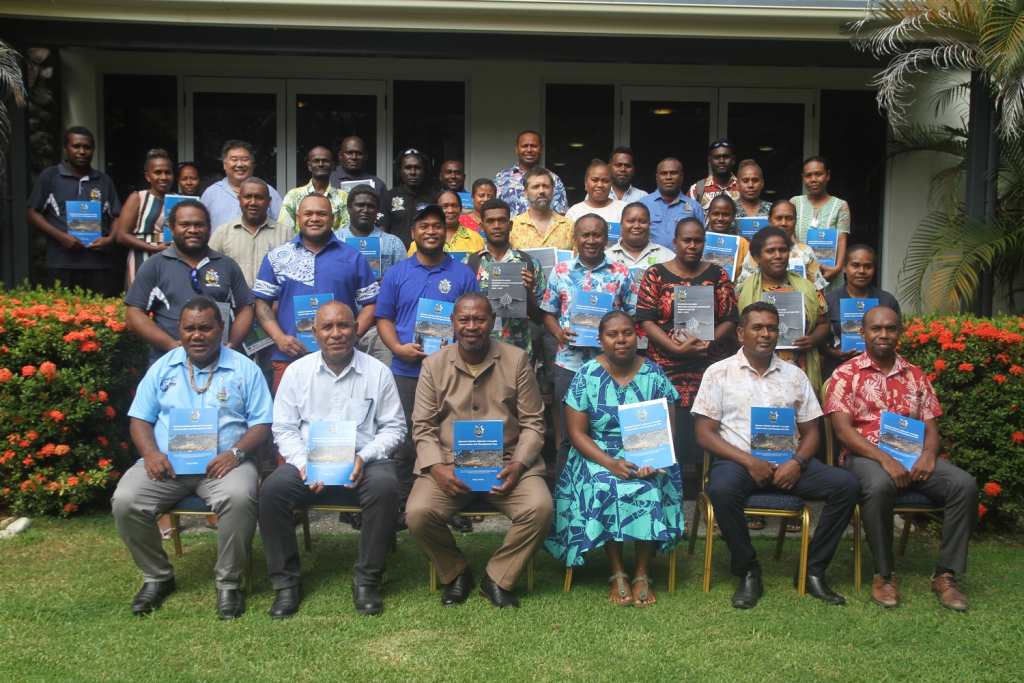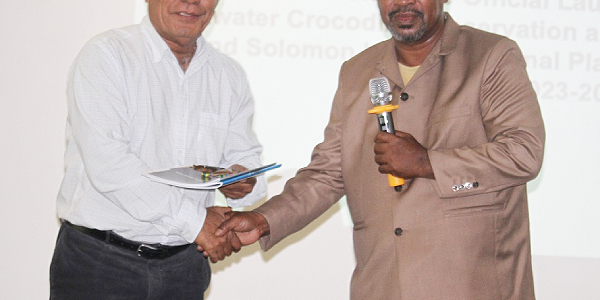THE Ministry of Fisheries and Marine Resources officially launched two key national marine species management plans for crocodile and turtle in Honiara on Wednesday.
This is part of the ministry’s signifying ongoing efforts to protect and manage its saltwater crocodile and marine turtle populations, a statement issued by the Government Communication Unit said.
Fisheries Minister Nestor Giro officially launched the Solomon Islands Crocodile Conservation and Management Plan 2023-2027 and Solomon Islands National Plan of Action for Marine Turtles 2023-2027.
Government described the launch as marking the start of the implementation of the two historic plans.
The plans were approved by Cabinet in November 2023 for implementation in 2024 following significant efforts by the Ministry of Environment, Climate Change, Disaster Management and Meteorology (MECDM) and the Ministry of Fisheries and Marine Resources (MFMR) in developing the plans with tremendous support from international and regional partners.
With its scope of work which focus on Fisheries by-catch mitigation and protected marine species conservation, the Solomon Islands Government prioritized the development of a National Plan of Action for marine turtles, and the crocodile conservation and management plan to address problem crocodiles and human conflict associated with crocodile attacks.
The initiative is led by the Secretariat of the Pacific Regional Environment Programme (SPREP) to support Pacific countries deliver their priorities to halt the decline of protected marine species, strengthen the sustainable management of their coastal and marine ecosystems and support poverty reduction.
The Initiative is a Key Result Area 5 of the Pacific-European Union Marine Partnership (PEUMP) programme funded by the European Union and the Government of Sweden to promote sustainable management and sound ocean governance for food security and economic growth, while addressing climate change resilience and conservation of marine biodiversity.
“The launching of these two national documents truly reflects the national progress made and the scientific findings that begin this important work that we are all here to witness and celebrate today,” Minister Giro said.
These two important marine species are listed in Appendix I of the Convention on International Trade of Endangered Flora and Fauna Species (CITES), which prohibits international trade of these species since Solomon Islands is a party to the Convention.
The five species of marine turtles that nest and forage on the beaches and waters of the Solomon Islands are listed as threatened with extinction under the International Union for Conservation of Nature’s Red List of Threatened Species.
“Thus, these plans are a platform to pursue our conservation and management initiatives as we progress and implement them,” Minister Giro said.
Findings have also highlighted that the marine turtle populations are known to be declining because of human population pressure, other human induces and the great impact of climate change on this important marine species, while the Solomon Islands saltwater crocodile populations have increased steadily following the cessation of their exports in 1993.

This species is now widespread across the country, and there are growing reports of crocodile attacks on humans and livestock across the provinces in the Solomon Islands.
This is the first ever Crocodile Management Plan for the Solomon Islands and is crucial for managing the increasing crocodile population and human-crocodile conflict.
This plan outlines a broad framework or platform for managing the risks posed by crocodiles to humans while ensuring the conservation of this species in the long term.
“The Saltwater Crocodile Management and Conservation Plan 2023-2027 (SWCMP) and the National Plan of Action (NPOA) for Marine Turtles 2023-2027 will advance Solomon Islands’ efforts to protect, manage, and sustainably utilize saltwater crocodiles and marine turtles for the benefit of all Solomon Islanders,” Minister Giro said.
Both the saltwater crocodile and marine turtle have local and global ramifications, which needs national effort to manage their populations and at the same time ensure their continued provision of critical ecological, socio-cultural, and economic benefits for the people of the Solomon Islands and the region.
The launch of the two key documents for these two national species reflects the government’s commitment and dedication to its management and conservation obligations locally and internationally.
(MECDM & MFMR)









